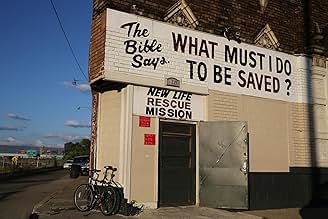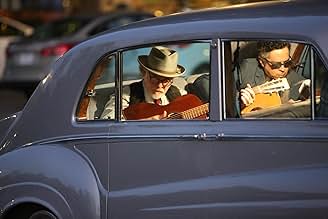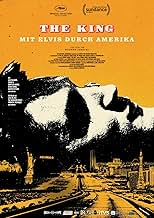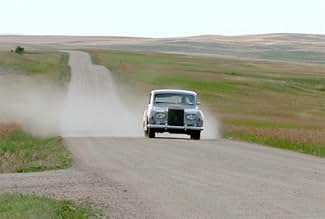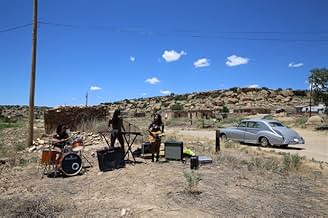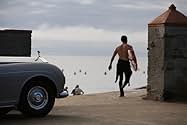IMDb RATING
6.9/10
1.3K
YOUR RATING
Forty years after the death of Elvis Presley, a musical road trip across America in his 1963 Rolls Royce explores how a country boy lost his authenticity and became a king while his country ... Read allForty years after the death of Elvis Presley, a musical road trip across America in his 1963 Rolls Royce explores how a country boy lost his authenticity and became a king while his country lost her democracy and became an empire.Forty years after the death of Elvis Presley, a musical road trip across America in his 1963 Rolls Royce explores how a country boy lost his authenticity and became a king while his country lost her democracy and became an empire.
- Director
- Writers
- Stars
- Awards
- 1 win & 10 nominations total
Elvis Presley
- Self
- (archive footage)
Mike Tyson
- Self
- (archive footage)
EmiSunshine
- Self
- (as Emi Sunshine & The Rain)
Franklin D. Roosevelt
- Self
- (archive footage)
Leo Bud Welch
- Self
- (as Leo "Bud" Welch)
Martin Luther King
- Self
- (archive footage)
- Director
- Writers
- All cast & crew
- Production, box office & more at IMDbPro
Featured reviews
I managed to find this documentary on DVD at my public library. I remember Elvis, he was only 10 years older than me. I remember when he died but really didn't have a concept of how young 42 is. Now that my own youngest son is 42 it hits me.
The documentary is good if you view it as a collection of different people expounding on what they thought his influence was rather than take everything as gospel, pun intended. Some of the black commenters are especially brutal, "hating" Elvis for what they perceive is unfair appropriation of black music, and more so for failing to use his influence to help the causes for eliminating racial bias.
Perhaps it is ultimately fortunate that Elvis died so young, he was a blazing comet that came, did his thing, then left. Imagine an 83-yr-old Elvis performing at Branson, a shade of his former self. No, that would just tarnish our memory of him.
A very interesting look at Elvis and his life, and a modern look at places he grew up and lived in. And of course his 1963 Rolls Royce, touring the country and breaking down now and then.
The documentary is good if you view it as a collection of different people expounding on what they thought his influence was rather than take everything as gospel, pun intended. Some of the black commenters are especially brutal, "hating" Elvis for what they perceive is unfair appropriation of black music, and more so for failing to use his influence to help the causes for eliminating racial bias.
Perhaps it is ultimately fortunate that Elvis died so young, he was a blazing comet that came, did his thing, then left. Imagine an 83-yr-old Elvis performing at Branson, a shade of his former self. No, that would just tarnish our memory of him.
A very interesting look at Elvis and his life, and a modern look at places he grew up and lived in. And of course his 1963 Rolls Royce, touring the country and breaking down now and then.
Still ruminating on this one. The film tries to compare the career of Elvis Presley to the rise and fall of the American dream. While taking a road trip in one of Elvis' Rolls Royce's (not a trademark Cadillac) and interviewing celebs, people who knew him, and people who didn't but live near where he did. Ambitious. Thought provoking. Originally called Promised Land then changed to The King. Just like the change of the title, the allegory doesn't quite work.
"Celebrity is the industrial disease of creativity." Mike Myers
It is commonly thought that America is in decline for the greatness it knew after WWII. Writer/director Eugene Jarecki has a vision in The King of a similar decline in Elvis Presley' life from unique, authentic talent to a has-been dead in his forties. This best-so-far-this-year documentary begs us to consider the analogy although to its credit, it does not force the similarities.
The film's interesting conceit suggests that both subjects bear their own responsibility for their descent-Elvis giving into commercialism and drugs, America, well, introducing itself to solipsism and commercialism, culminating in the election of Donald Trump. While America is a decline in progress, Elvis gave up 30 years ago but has never been forgotten.
That's the rub-he achieved artistically and financially beyond even Col. Parker's wildest expectations, but Elvis was not able to handle the fame or the money. Or maybe when you can buy all the cheeseburgers and drugs you want, you can watch your belly grow as your mind shuts down. Jarecki uses Elvis's 1963 Rolls Royce to have performers like Immortal Technique and Emi Sunshine sing in the back seat about America.
As Jarecki winds in the Rolls from Memphis to New York, Vegas, and back to Memphis, it slowly becomes clear this should been one of Elvis's pretty Cadillac's; how ironically perfect that it's a Rolls, so out of touch with his roots.
Besides the simple lamentation of greatness gone too soon is the argument that Elvis appropriated Black culture on his road to fame and wealth. Although arguments abound on both sides, this point illustrates the varied richness Jarecki brings to his documentary,
At any rate, having just watched Whitney about her great voice and its descent with the help of drugs, I am dismayed that such is sometimes the fate of the great. America is no different, and the frequently-montaged images from presidents to celebrities are sometimes surprising, sometimes depressing, but never dull. Jarecki has a gallery of shots that would be impressive even without sound. It's a museum of our glory and our loss.
Along this nostalgic road, and America itself seems to be stuck there without a clue about how to save its future from the decision it made in 2016, is the prevailing idea that Elvis also followed the money and the easy way. We see how he ended up, so can we learn and make some tough decisions now?
It is commonly thought that America is in decline for the greatness it knew after WWII. Writer/director Eugene Jarecki has a vision in The King of a similar decline in Elvis Presley' life from unique, authentic talent to a has-been dead in his forties. This best-so-far-this-year documentary begs us to consider the analogy although to its credit, it does not force the similarities.
The film's interesting conceit suggests that both subjects bear their own responsibility for their descent-Elvis giving into commercialism and drugs, America, well, introducing itself to solipsism and commercialism, culminating in the election of Donald Trump. While America is a decline in progress, Elvis gave up 30 years ago but has never been forgotten.
That's the rub-he achieved artistically and financially beyond even Col. Parker's wildest expectations, but Elvis was not able to handle the fame or the money. Or maybe when you can buy all the cheeseburgers and drugs you want, you can watch your belly grow as your mind shuts down. Jarecki uses Elvis's 1963 Rolls Royce to have performers like Immortal Technique and Emi Sunshine sing in the back seat about America.
As Jarecki winds in the Rolls from Memphis to New York, Vegas, and back to Memphis, it slowly becomes clear this should been one of Elvis's pretty Cadillac's; how ironically perfect that it's a Rolls, so out of touch with his roots.
Besides the simple lamentation of greatness gone too soon is the argument that Elvis appropriated Black culture on his road to fame and wealth. Although arguments abound on both sides, this point illustrates the varied richness Jarecki brings to his documentary,
At any rate, having just watched Whitney about her great voice and its descent with the help of drugs, I am dismayed that such is sometimes the fate of the great. America is no different, and the frequently-montaged images from presidents to celebrities are sometimes surprising, sometimes depressing, but never dull. Jarecki has a gallery of shots that would be impressive even without sound. It's a museum of our glory and our loss.
Along this nostalgic road, and America itself seems to be stuck there without a clue about how to save its future from the decision it made in 2016, is the prevailing idea that Elvis also followed the money and the easy way. We see how he ended up, so can we learn and make some tough decisions now?
The King is essentially three or four really good documentaries edited into one and that's where the trouble starts. Elvis' life and career are fascinating to watch. And the lies on which the American dream is built - stolen land, slavery, apartheid, the corrupted political system - deserve every effort to refocus public awareness. The roadtrip in Elvis' old Rolls Royce is a nice idea. Just that trying to link his rise and fall to all that happens in America over the past 70 years seems forced and doesn't give each story the necessary time and attention. Viewing The King I felt like watching an interesting docu on TV while someone else got hold of the remote and constantly switches to another channel. 8 Stars for the original idea, 2 Stars for execution.
Late one night, I came upon this little ditty on PBS, as the moon was about say adios. To echo what others have said, this film has an abundance of nice images, and it welcomes a plethora of comments from those who respected, love, and even pitied Elvis. There are some poignant moments from those who were close up to the King. One of the most touching moments comes when a contemporary musician feels such empathy for Elvis, that he can't help but shed painful tears.
As "GORTX" (and other reviewers) have wisely pointed out, the director felt compelled to connect some dots in a bit of a reckless way... particularly when he compares the dynamics of Elvis with today's political climate and the American Dream. When he does this, it somehow minimizes certain parts of the singer's dramatic narrative.
You'll will find some good stuff here, even if you think the political references are not justified. Try to absorb the lively rhythm and zesty imagery. Elvis had an easy charm and a distinct voice. His face was unusually striking. While his physicality might seem superficial, his looks served him well, and propelled his fame to a deeper level.
As "GORTX" (and other reviewers) have wisely pointed out, the director felt compelled to connect some dots in a bit of a reckless way... particularly when he compares the dynamics of Elvis with today's political climate and the American Dream. When he does this, it somehow minimizes certain parts of the singer's dramatic narrative.
You'll will find some good stuff here, even if you think the political references are not justified. Try to absorb the lively rhythm and zesty imagery. Elvis had an easy charm and a distinct voice. His face was unusually striking. While his physicality might seem superficial, his looks served him well, and propelled his fame to a deeper level.
Did you know
- TriviaThe car featured in the documentary is a 1963 Rolls Royce Phantom V touring limousine with coachwork by James Young and was owned by Elvis. It was bought by the film makers at Bonhams auction in 2014 for $396000. It was resold after filming and now resides at the Hard Rock Hotel & Casino in Las Vegas.
- ConnectionsFeatures King Kong (1933)
- How long is The King?Powered by Alexa
Details
- Release date
- Countries of origin
- Official site
- Language
- Also known as
- Promised Land
- Filming locations
- Production companies
- See more company credits at IMDbPro
Box office
- Gross US & Canada
- $259,291
- Opening weekend US & Canada
- $29,050
- Jun 24, 2018
- Gross worldwide
- $273,601
- Runtime
- 1h 47m(107 min)
- Color
- Aspect ratio
- 2.35 : 1
Contribute to this page
Suggest an edit or add missing content



